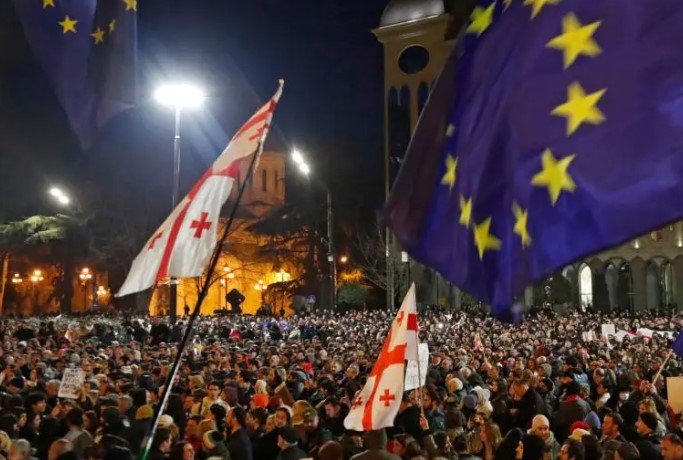In a bold display of civic engagement, the streets of Tbilisi have become a stage for democracy in action. Citizens from all walks of life have converged on Rustaveli Avenue, a symbol of Georgian independence, to voice their opposition to the reintroduction of a law that many fear marks a return to Russian-style governance. This legislation, which had been previously set aside due to public outcry, has once again ignited the passion of a people determined to protect their nation’s autonomy and democratic ideals.
The Stirrings of Discontent
The proposed legislation, ostensibly aimed at increasing transparency regarding foreign influence, has been met with skepticism and alarm. Critics argue that it is a thinly-veiled attempt to stifle dissent and control civil society, drawing uncomfortable parallels with Russian legal measures.
The initial protests were spontaneous, a visceral reaction to the perceived threat to Georgian democracy. Citizens gathered, armed with nothing but homemade signs and a shared sense of urgency, to express their discontent.

As word spread, the gatherings grew in size and fervor. Organized groups began to emerge, coordinating their efforts to rally support and draw international attention to their cause.
The demonstrations have since evolved into a well-organized movement, with clear demands and a message that resonates with a significant portion of the Georgian population: the preservation of their hard-fought freedoms.
A Nation’s Identity at Stake
The controversy surrounding the law has stirred deep-seated concerns about Georgia’s future direction. The country, which has long strived for closer ties with Europe, now faces a crossroads that could define its trajectory for years to come.
The debate has transcended legal jargon, touching on the very essence of what it means to be Georgian in the modern world. It is a conversation about values, about the kind of society that Georgians want to build for themselves and their children.
The protests are not just about a single piece of legislation; they are a manifestation of a broader struggle for identity and sovereignty, a refusal to be pulled back into a sphere of influence that many thought they had left behind.
The Echoes of Solidarity
The protests in Tbilisi have not gone unnoticed. Messages of support have poured in from around the world, as international observers watch closely to see how the situation will unfold.
The Georgian diaspora has been particularly vocal, leveraging their networks abroad to amplify the voices of those on the streets of Tbilisi.
The implications of these protests are far-reaching, potentially influencing not only the future of Georgia but also the dynamics of regional politics in Eastern Europe.
